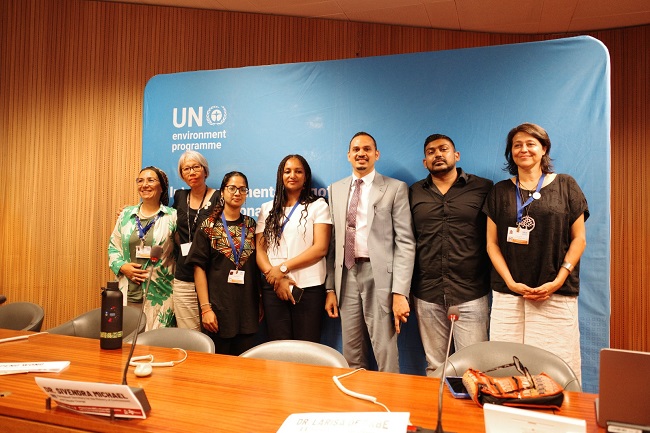Demonstrating strong unity, Global South Member States and Civil Society called for ambitious, legally binding global measures to curb plastic production, in a media briefing on Thursday, August 14, 2025, the closing day of the second part of the fifth session of the Intergovernmental Negotiating Committee (INC-5.2), held by the Global Alliance for Incinerator Alternatives (GAIA).
The event brought together civil society organisations (CSOs) from across the Global South, including the Association de l’Education Environnementale pour les Futures Générations- Tunisia, C4 Center – Malaysia, and Acción Ecológica Mexico. It also featured distinguished delegates from Ethiopia and Fiji, including Hiwot Hailu, Chief of Staff at the Environmental Protection Authority of the Federal Democratic Republic of Ethiopia, and Dr. Sivendra Michael, Permanent Secretary at Fiji’s Ministry of Environment and Climate Change.

This gathering took place against the backdrop of the Chair’s latest text, released on Wednesday, August 12, which was universally rejected by countries and civil society groups. The text leaves out a key article on reducing plastic production, going against the treaty’s mandate to address plastics across their full life cycle, amongst other pressing issues. This position shaped the demands voiced by the panelists during the media briefing.
Merrisa Naidoo, GAIA Africa’s Plastics Programme Manager, stressed that a flawed process cannot deliver good outcomes.
“Consensus is not democracy. It ignores the will of the vast majority of member states and, unfortunately, has to cater to the wish list of the petro-states and fossil fuel industry,” submitted Naidoo.
This sentiment was further emphasised by Semia Gharbi, Chairperson & Co-Founder, Association de l’Education Environnementale pour les Futures Générations, who stated that the article on health in the Chair’s text was deleted in the current version.
“We have to remind our delegates that we must protect the environment. With a growing plastic crisis, we cannot ignore science,” said Gharbi.
SiPeng Wong of C4 Center in Malaysia stated, “If we don’t control the amount of waste being produced, it will end up exported to my country and region. In Southeast Asia, the volume of waste that reaches our backyard is unmanageable”. SiPeng noted that Malaysia alone receives over 415 million kg of waste from Global North countries.
“Without reducing the generation of waste, we will end up having to manage it”.
Dr. Larisa de Orbe of Acción Ecológica México expressed that plastic pollution already exceeded the limits of what people and nature can handle.
“Our government must negotiate free from industry pressure in order to truly safeguard the health and well-being of current and future generations,” Orbe said.
During the briefing, Member State representatives addressed questions about the role of Global South leadership in the treaty process. They were asked whether the critical priorities of the Global South were reflected in the Chair’s latest draft text, their reactions to it, and how civil society can support efforts to uphold ambitious commitments.
Responding to the question, a delegate from Fiji, Dr. Sivendra Michael, Permanent Secretary, Ministry of Environment and Climate Change, Fiji Government, said, “The last iteration of the text, which came out yesterday, we know is a serious regression from the UNEA Mandate 5/14 given to us as governments. We all agreed at UNEA 5 that we would address the full lifecycle of plastic.”
Furthermore, he highlighted, “There are many metaphors that we use, but one is that we can’t continue mopping the floor without turning the tap. We need legally binding global measures to control production.”
A delegate from Ethiopia, Hiwot Hailu, Chief of Staff, Federal Democratic Republic of Ethiopia, Environmental Protection Authority, commented on the supportive role played by civil society within the INC-5.2, calling them the engine of our negotiating process.
“We need civil society to continue to be a partner, providing pressure from the outside to ensure negotiations don’t lose sight of our shared goals, and to continue advocacy for a legally binding plastic treaty that protects people and our planet,” stated the delegate from Ethiopia.
